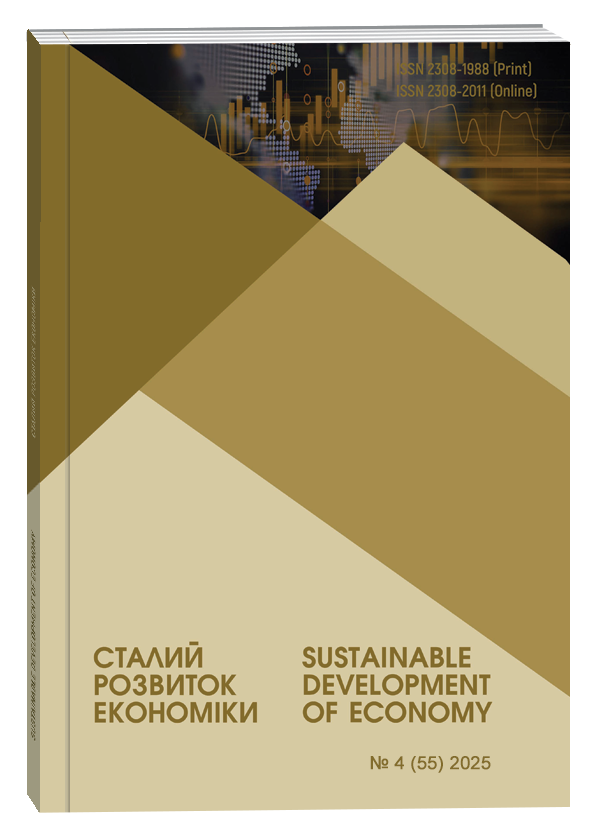РОЗВИТОК ОБЛІКОВО-АНАЛІТИЧНОГО ЗАБЕЗПЕЧЕННЯ УПРАВЛІННЯ В УМОВАХ ЦИФРОВОЇ ЕКОНОМІКИ: ОНТОЛОГІЧНИЙ ТА ГНОСЕОЛОГІЧНИЙ АСПЕКТИ
Анотація
Розглянуто розвиток обліково-аналітичного забезпечення управління в умовах цифрової економіки крізь призму онтологічного та гносеологічного підходів. Розкрито зміст онтологічної трансформації обліку, що полягає у переході від паперово-документальної форми до цифрово-онтологічної моделі даних, у межах якої інформація набуває властивостей динамічності, інтегрованості та самоверифікації. Проаналізовано гносеологічну еволюцію обліку – від описової до когнітивно-аналітичної моделі пізнання економічних явищ. Доведено, що в умовах цифрової економіки джерелом знань стають не документи, а дані, які проходять аналітичну обробку, алгоритмічну інтерпретацію та когнітивне осмислення. Обґрунтовано, що інтеграція онтологічних і гносеологічних підходів формує нову методологічну парадигму обліково-аналітичного забезпечення управління, у межах якої дані, знання й алгоритми утворюють єдиний інтелектуальний простір. Така система забезпечує безперервність, достовірність та прогностичність інформації, створюючи підґрунтя для інтелектуального управління підприємством у цифрову епоху.
Посилання
Бардаш С. В., Грабчук І. Л. Цифрові технології в сфері бухгалтерського обліку: основні можливості та ризики. Ефективна економіка. 2021. № 9. URL : http://www.economy.nayka.com.ua/?op=1&z=9301 (дата звернення: 10.10.2025).
Бухгалтерський облік та оподаткування в умовах застосування інформаційних технологій: теорія і практика : монографія / В. О. Осмятченко, С. В. Шевчук, Я. О. Ізмайлов [та ін.] ; за заг. ред. В. О. Осмятченка ; Ун-т держ. фіск. служби України. Ірпінь : Ун-т ДФС України, 2020. 394 с.
Жиглей І. В., Лайчук С. М., Поліщук І. Р. Використання інформаційних технологій у бухгалтерському обліку. Економіка, управління та адміністрування. 2024. № 1 (107). С. 95–102. URL: https://eztuir.ztu.edu.ua/jspui/bitstream/123456789/8461/1/95.pdf (дата звернення: 10.10.2025)
Муравський В. В. Комп’ютерно-комунікаційна форма обліку: монографія. Тернопіль : ТНЕУ, 2018. 486 с.
Alwan A. A. Effect of using Cloud Computing technology on the accounting job. International journal of research in social sciences & humanities. 2022. Vol. 12. no. 02. URL: https://doi.org/10.37648/ijrssh.v12i02.022 (дата звернення: 10.10.2025).
Gyau E. K., Owiredu-Ghorman K., Amaning N., Kpimekuu P. B. Qualitative Analysis on Costs and Benefits of Adopting a Cloud-Based Accounting Information System: A Case Study of Rural Banks in Ghana. European Journal of Accounting, Auditing and Finance Research. 2023. Vol. 11. no. 6. URL: https://doi.org/10.37745/ejaafr.2013/vol11n67091 (дата звернення: 10.10. 2025).
Pramuka B. A., Pinasti M. Does cloud-based accounting information system harmonize the small business needs? Journal of Information and Organizational Sciences. 2020. Vol. 44. no. 1. URL: https://doi.org/10.31341/jios.44.1.6 (дата звернення: 10.10. 2025).
Zadorozhnyi Z.-M., Muravskyi V., Shevchuk O., Muravskyi V., & Zadorozhnyi M. Digitization of Accounting in the Innovative Management of Autonomous Robotic Transport. Marketing and Management of Innovations. 2024. № 15 (3). рр. 110–126.
Bardash, S. V., & Hrabchuk, I. L. (2021). Tsyfrovi tekhnolohii v bukhhalterskomu obliku: osnovni mozhlyvosti ta ryzyky [Digital technologies in accounting: main opportunities and risks]. Efficient Economy, no. 9. Available at: http://www.economy.nayka.com.ua/?op=1&z=9301 (in Ukrainian)
Osmiachenko, V. O., Shevchuk, S. V., Izmailov, Ya. O., et al. (2020). Bukhhalterskyi oblik ta opodatkuvannia v umovakh informatsiinykh tekhnolohii: teoriia ta praktyka [Accounting and taxation in the context of information technologies: theory and practice] (V. O. Osmiachenko, Ed.). Irpin: University of the State Fiscal Service of Ukraine, 394 p. (in Ukrainian)
Zhyhlei, I. V., Laichuk, S. M., & Polishchuk, I. R. (2024). Zastosuvannia informatsiinykh tekhnolohii v bukhhalterskomu obliku [The use of information technologies in accounting]. Economics, Management and Administration, no. 1(107), pp. 95–102. Available at: https://eztuir.ztu.edu.ua/jspui/bitstream/123456789/8461/1/95.pdf (in Ukrainian)
Muravskyi, V. V. (2018). Komp’iuterno-komunikatsiina forma obliku: monohrafiia [Computer-communication form of accounting: Monograph]. Ternopil: TNEU, 486 p. (in Ukrainian)
Alwan, A. A. (2022). Effect of using Cloud Computing technology on the accounting job. International Journal of Research in Social Sciences & Humanities, no. 12(2). DOI: https://doi.org/10.37648/ijrssh.v12i02.022
Gyau, E. K., Owiredu-Ghorman, K., Amaning, N., & Kpimekuu, P. B. (2023). Qualitative analysis on costs and benefits of adopting a cloud-based accounting information system: A case study of rural banks in Ghana. European Journal of Accounting, Auditing and Finance Research, no. 11(6). DOI: https://doi.org/10.37745/ejaafr.2013/vol11n67091
Pramuka, B. A., & Pinasti, M. (2020). Does cloud-based accounting information system harmonize the small business needs? Journal of Information and Organizational Sciences, no. 44(1). DOI: https://doi.org/10.31341/jios.44.1.6
Zadorozhnyi, Z.-M., Muravskyi, V., Shevchuk, O., Muravskyi, V., & Zadorozhnyi, M. (2024). Digitization of accounting in the innovative management of autonomous robotic transport. Marketing and Management of Innovations, no. 15(3), pp. 110–126.


